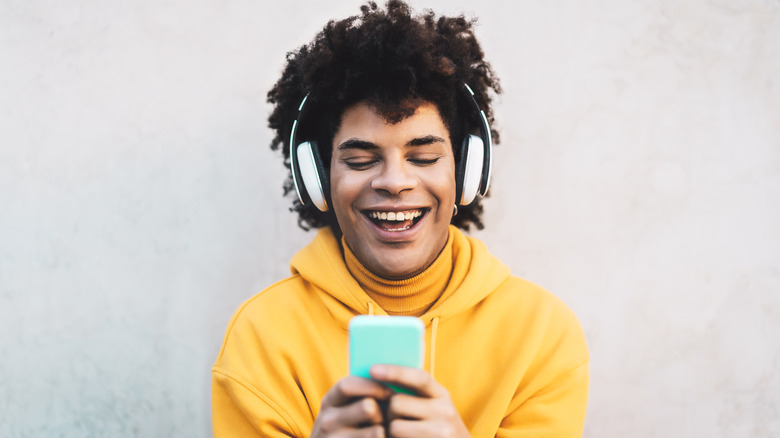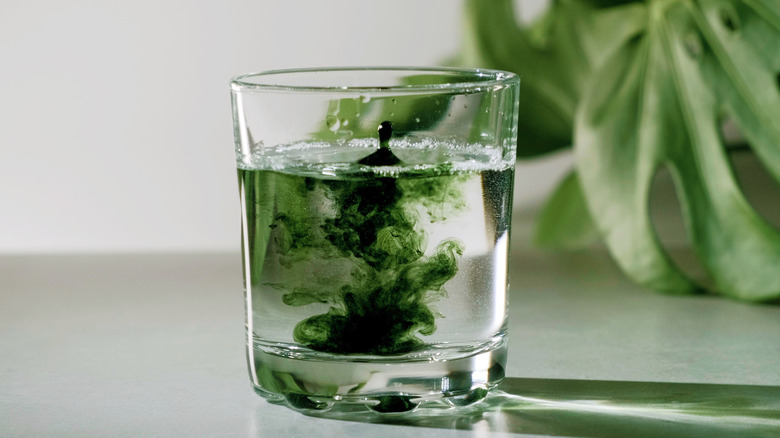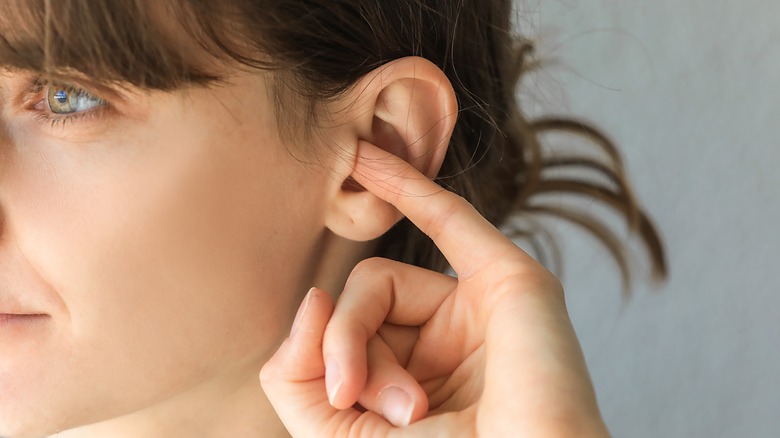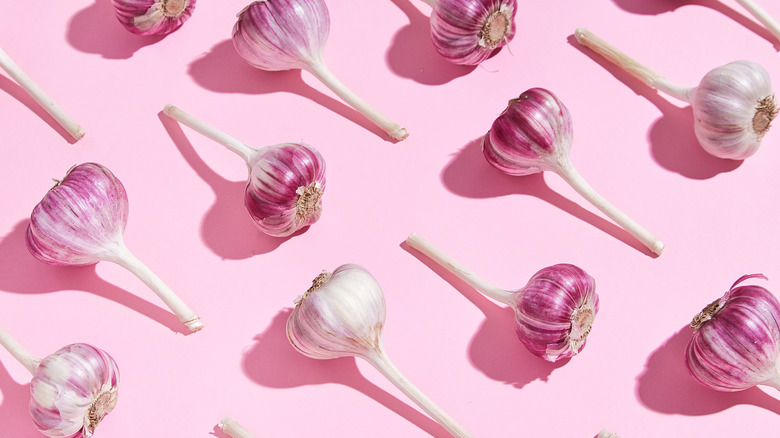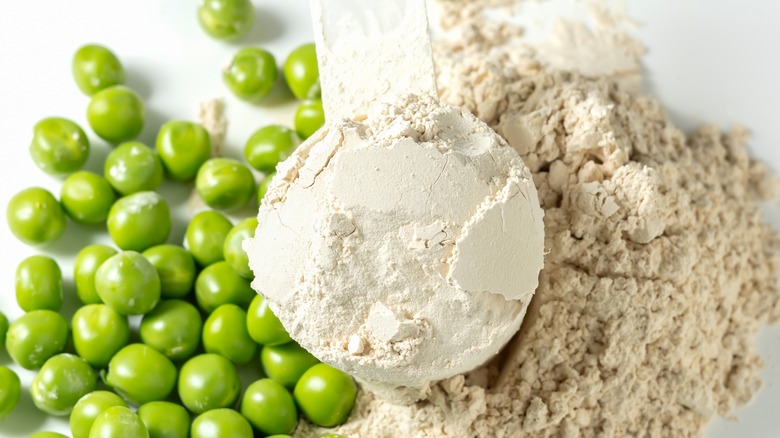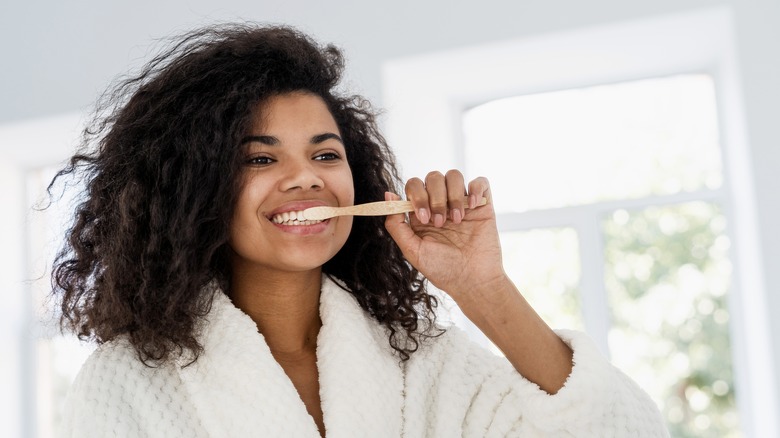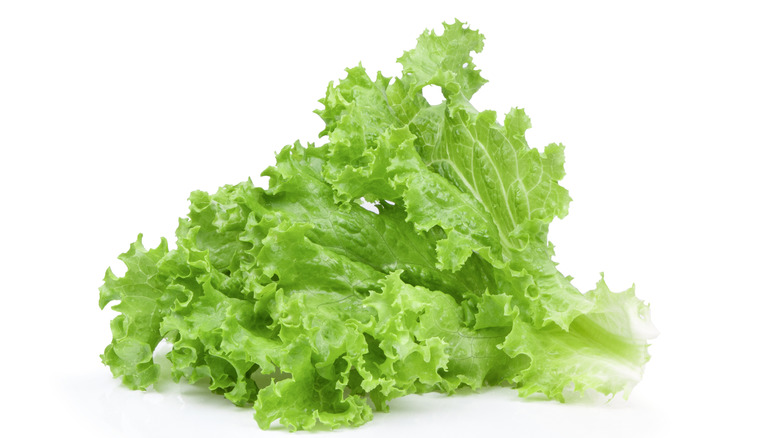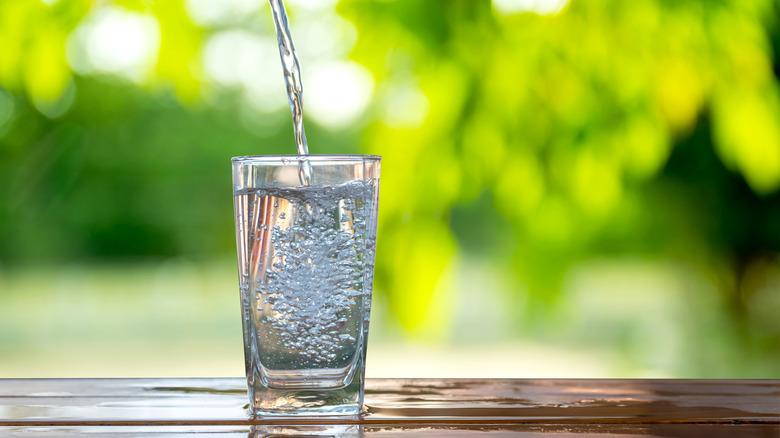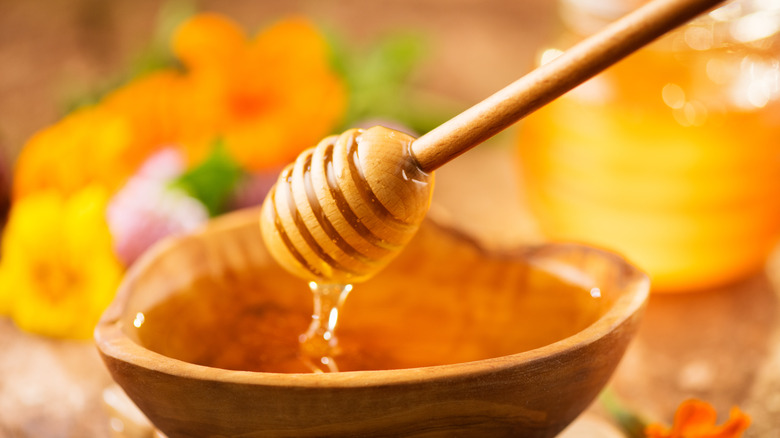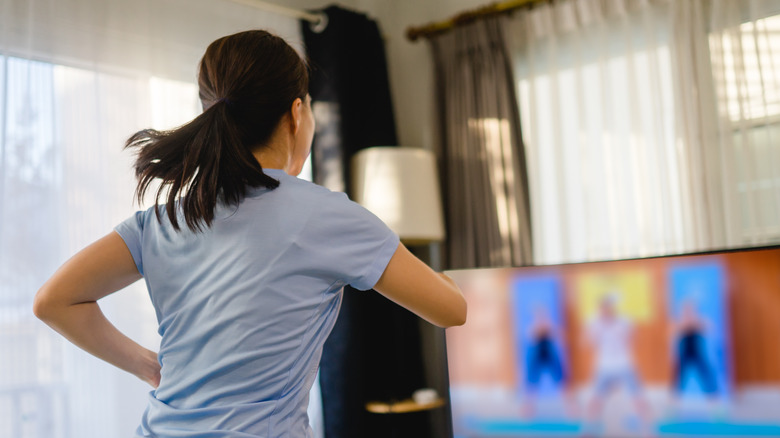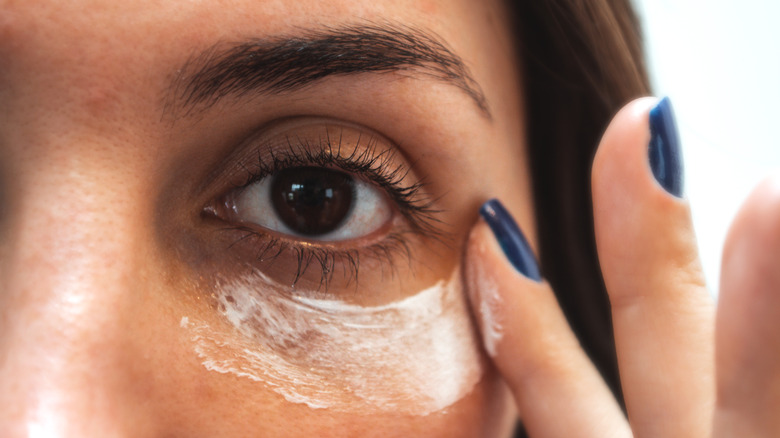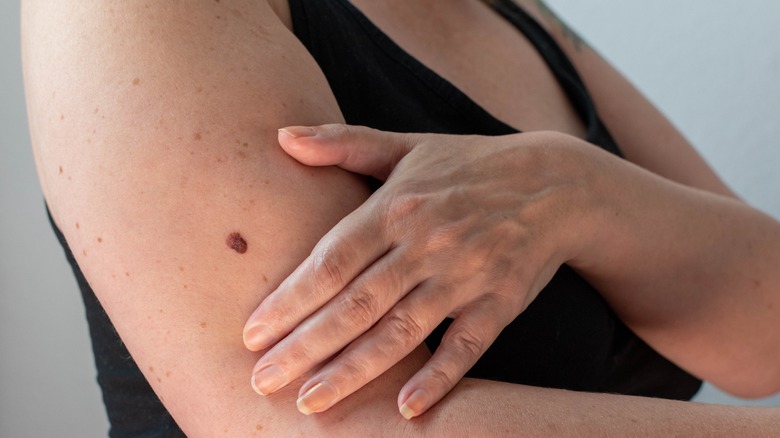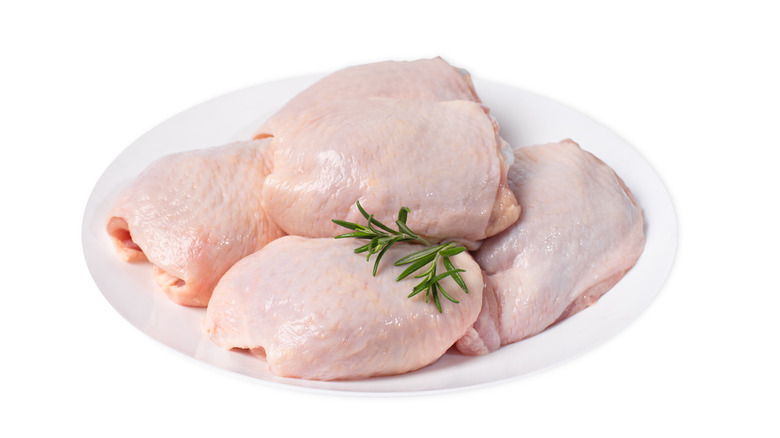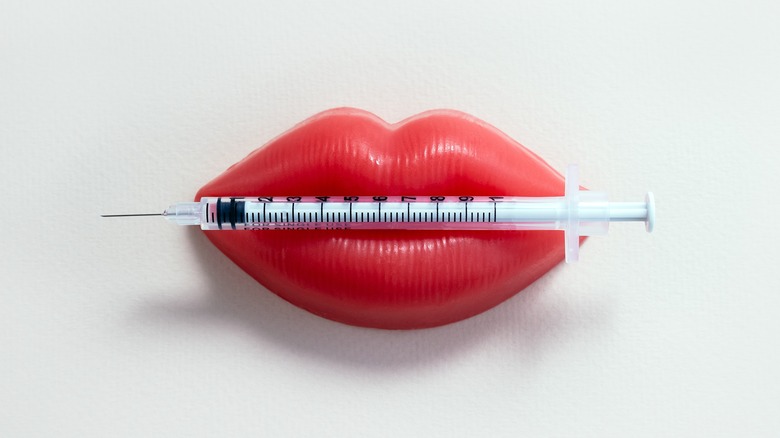Health Advice On TikTok That Straight Up Lied To You
TikTok ranks sixth in the top 10 social media apps of 2022. With over one and a half billion active users and more than a billion videos watched per day, it's safe to say TikTok's a hit (via Demand Sage). Life hacks are one of the most common and popular types of videos posted on TikTok — this category has over 46 billion views collectively (per In the Know). Maybe that's what makes TikTok so addicting: Every time you scroll through the app, you leave with new life-altering tips and tricks that will seemingly make your life better. There are countless life-hack genres, from cleaning and cooking to technology and health. But the thing about TikTok is that anyone can post content that has the potential to go viral, which is great for the underdog, but no so great when it comes to health advice. While some health tips can be harmless, some can be downright dangerous; and taking medical advice from a random person on the internet who may or may not have medical training can be risky. Let's explore some of the most popular TikTok health trends that should be cancelled.
Liquid chlorophyll cannot cure everything
Liquid chlorophyll has been touted as a cure-all for everything from acne and obesity to bad breath and even cancer (via Healthline). Chlorophyll is a pigment that gives plants their green color, and it also contains vitamins and antioxidants that may have potential health benefits. Liquid chlorophyll is a water-soluble supplement that can be added to water, smoothies, or other beverages (via Forbes). Unfortunately, as WebMD notes, there is not sufficient research to back up health claims about liquid chlorophyll.
While it isn't dangerous to consume, there are some potential negative side effects, including diarrhea and digestive issues. Taking chlorophyll consistently can also cause your skin to be more sensitive to the sun, leaving you more prone to sunburn, and there are some prescription medications that don't mix well with the supplement. "Chlorophyll drops are safe to use in moderation, but your body also probably doesn't really need them," dietitian Beth Czerwony told the Cleveland Clinic.
Don't pour hydrogen peroxide in your ears to clean them
Let's get straight to the point: Pouring hydrogen peroxide into your ears is not a healthy life hack. Sure, hydrogen peroxide is a common ingredient in ear drops, but undiluted it can be irritating (via Cleveland Clinic). Generally speaking, cleaning out your ears is not a necessary hygiene practice at all. The body naturally produces earwax to shield your inner ears from bacteria, fungus, and other invaders (per Medical News Today). Typically, your body discharges any unneeded earwax on its own. Sometimes, though, earwax may accumulate — and while uncommon, an excess of earwax can lead to infection, earaches, tinnitus, hearing problems, itchiness, and more. If you're having ear issues or think you may have too much earwax, its best to schedule a doctor appointment instead of attempting to take matters into your own hands. Over-the-counter ear drops are fine to use periodically, but mixing up your own hydrogen peroxide solution can be risky (via the Cleveland Clinic).
Sticking garlic in your nose will not cure congestion
Have you seen the TikTok videos of people stuffing raw garlic cloves up their nose, and when they take them out, massive amounts of mucus come out like a waterfall? Trigger warning: It may be hard to watch and equally hard to look away. But are these videos proof that garlic clears up congestion? Not at all, according to Today. In fact, plugging your nose up encourages your body to produce mucus, which is why so much comes out after the blockage — garlic, in this case — is removed. So the garlic isn't clearing congestion at all — it's actually causing more mucus to form.
In addition to leaving a bad smell in your nostrils and an uncomfortable mess to clean up, raw garlic can be irritating to your sensitive mucus membranes that line the inside of your nose (via the Cleveland Clinic). The next time you're congested, leave the garlic in your curry and seek out more tried-and-true cold remedy methods like over-the-counter medication, sleep, and water. You could also try using an essential oil diffuser with peppermint, eucalyptus, or tea tree oil to ease symptoms (per Medical News Today).
Eating protein powder dry can have dangerous side effects
One TikTok trend that you should definitely avoid is called "dry scooping," which refers to eating protein powder without mixing it in water before a workout. TikTokers claim that your body processes the powder more quickly this way, supposedly boosting your energy and strength to make your exercise more effective (via Healthline). Not only is this untrue, but dry scooping is an unhealthy and potentially life-threatening practice. It's possible to accidentally inhale some of the powder into your lungs, which can lead to irritation or infection. Dry scooping can also cause digestive distress. Plus, most protein powders contain a lot of caffeine — and while this can be taken in safely if you mix with water and don't chug it all down at once, consuming it too quickly overloads your body with caffeine, placing extreme stress on your cardiovascular system. In fact, at least one young social media influencer has experienced a heart attack after dry scooping (per Hackensack Meridian Health). The risks are too high — just don't do it.
Lemon coffee isn't a weight-loss miracle cure
Have you ever put lemon in your coffee? Probably not — sour and bitter doesn't sound like an obvious go-to combination — unless you've seen the "coffee and lemon diet" TikTok videos. While the anecdotal stories may seem compelling, there's no actual evidence that confirms this less-than-tasty concoction actually helps you lose weight (via Good Housekeeping). There are potential health benefits to both lemon and coffee, each in their own right. Both have antioxidants — vitamin C and flavonoids in lemons, and caffeine and chlorogenic acid in coffee, according to Healthline. And some research suggests that the caffeine in coffee may help boost metabolism, which could be why those who drink lemon coffee notice a slight weight change. Plus, if your usual morning beverage is packed with calories, like a venti mocha Frappuccino with whipped cream from Starbucks, then replacing it with a zero-calorie lemon-and-coffee beverage could make a difference. Either way, there are no known health risks to drinking this mix, so if you don't mind the taste, go for it — but you could also just drink black coffee.
Using hydrogen peroxide to whiten your teeth can cause damage
Swishing with hydrogen peroxide in the morning to get those pearly whites because you saw it on TikTok? You might want to rethink this habit. While hydrogen peroxide is a common ingredient in teeth whitening kits, it's not the main component, and it's usually diluted. Using straight hydrogen peroxide in your mouth can be irritating to your gums and teeth, leading to tooth enamel damage and other health complications (via Accelerated Urgent Care). In fact, even using over-the-counter teeth whitening products can lead to these side effects. Scientific studies have shown that when used as directed, at-home whitening kits are generally "safe and effective," but the most common side effects observed are "tooth sensitivity and gingival irritation." If this happens to you, Medical News Today recommends you suspend use of the product causing the irritation and check in with your dentist to discuss alternative teeth-whitening methods.
Lettuce water won't help your insomnia
The "lettuce water" TikTok health trend basically involves steeping raw lettuce in boiling water for several minutes, like you would dried tea leaves, then straining and drinking it. Proponents say it makes you drowsy and helps you sleep. If you're curious about how boiled lettuce tastes, you can give it a try. But as for the efficacy of lettuce water to treat insomnia, experts agree: There is no evidence to back this claim up (via The New York Times).
This trend is likely a perpetuation of an old folk remedy. Indeed, according to an article published in Food Science and Biotechnology, different types of lettuce were used as a sedative in the 19th century. Some TikTokers also cite a 2017 study on mice that suggests that romaine lettuce has a "sleep-potentiating material." Michelle Drerup, director of the behavioral sleep medicine program at the Cleveland Clinic Sleep Disorders Center, analyzed the study and concluded that there were several limitations that jeopardized the findings. "It doesn't really support the hypothesis of the lettuce water doing anything," Dr. Drerup told The New York Times. As for TikTok reports that lettuce water is a sleep elixir, Dr. Drerup chalks it up to the placebo effect.
Alkaline water isn't a cure-all
If you haven't heard the news yet: Alkaline water is a scam. According to the Mayo Clinic, alkaline water won't bring special health perks for most people that your typical glass of tap water will not. TikTokers declare that drinking alkaline water makes your blood less acidic and balances your internal pH levels — in this way, it's purported to help support digestion, strengthen your bones, and even prevent cancer (via Kelly Jones Nutrition). But contrary to claims, alkaline water has not been shown to help with digestive issues like acid reflux, and it does not alter your cancer risk or treatments (per Forbes). Plus, one scientific study showed that an alkaline diet was not linked to bone health. Forbes goes as far as to say that alkaline water is "a big waste of money." Also, it doesn't look good that Robert O. Young, who made alkaline water and the pH diet famous with his book "The pH Miracle: Balance Your Diet, Reclaim Your Health," went to jail for practicing medicine without a license (via The San Diego Union-Tribune).
Frozen honey is an unhealthy snack you should avoid
The frozen honey trend was created by Dave Ramirez, who posted a TikTok video of himself struggling to squeeze out honey he froze in a water bottle, then proclaiming, "That was pretty refreshing," after taking a massive bite. The video went viral with almost 900 million views and counting, with many people posting videos of themselves participating in what's called the "frozen honey challenge." While honey is often acknowledged as a healthy alternative to processed sugar, it is still sugar. In small amounts, honey can be a healthy part of a diet — but when eaten in huge quantities, like in this trend, not so much (via Accelerated Urgent Care).
Unsurprisingly, eating high amounts of sugar can lead to cavities; gut issues like nausea, bloating, gas, or diarrhea; and blood sugar spikes. Honey is also extremely high in calories: One tablespoon holds about 17 grams of sugar and 64 calories. This unhealthy trend exemplifies the reasons why when it comes to food and nutrition, you should turn to professionals for advice rather than TikTok. "I do always say consider the source. Make sure if you are following a food trend, or taking some nutritional advice that this person is credible, that this person is a registered dietitian," Charmaine Jones, a registered dietitian nutritionist, told Verify This.
This five-minute workout won't melt belly fat
People love to dance on TikTok — for fun or as part of a workout routine. The latest dance trend for weight loss involves twisting your body from side-to-side while simultaneously shaking your hips and chest, focusing on engaging your abs. TikTokers say that practicing this dance workout just five minutes a day will melt belly fat away (via Accelerated Urgent Care). Sadly, this type of targeted workout, often called spot reduction, doesn't really work as advertised. Focusing in on a small area won't help you cut fat in that area first. The only way to lose belly fat is to burn your overall body fat in general (via Health Shots). And the real secret to shedding body fat? Consistent physical activity, including both cardio and strength training, as well as a healthy diet. That said, you don't have to give up dancing as a workout option. It can be a fun way to get in aerobic activity — you can expend around 130-250 calories in just a half an hour of dancing (per WebMD).
Sunscreen contouring will lead to undesirable sun damage
Let's break down the sunscreen contouring "life hack." First off, contouring is typically done with makeup, and is a technique that utilizes contrasting colors to sculpt your facial features (via PR Week). Some TikTokers, though, have taken it upon themselves to use the sun instead of makeup to encourage tan lines to form in a way that "naturally" contours the face. Some people mix and match sunscreens with different SPFs on certain parts of their face to get their desired look, while others only use sunscreen on specific facial regions and forego it on others.
While the results may make you feel sexy temporarily, the long-term skin damage may not be worth it. Experts agree: Exposing your face to the sun in this way is dangerous. UV rays damage the skin, which can lead to wrinkles, age spots, and even cancer. "When you are contouring with sunscreen, you are exposing your skin to radiation," board-certified dermatologist and assistant clinical professor of dermatology Jeanne Graf told Allure. It's best to lather up with sunscreen and stick to makeup for that contoured look.
DIY mole removal may hide skin cancer and cause other issues
Do you wish you could get rid of that pesky mole on your skin once and for all? Some TikTok videos are encouraging people to remove their moles on their own at home, which can be very risky business. There are a variety of different DIY mole removal methods, from using apple cider vinegar and over-the-counter skin tag removal kits, to outright just picking at it (via Buzz Feed). But it's important to remember that any new moles that are distressing to you should be checked out by a doctor or dermatologist, who will examine them to determine if you may have skin cancer. Removing a mole that might be an indication of skin cancer won't get rid of the cancer — there may still be dangerous cells underneath your skin. Plus, extracting moles without assistance from a professional can lead to scars or infection. As board-certified dermatologist Dr. Joyce Park said to BuzzFeed, "Dermatologists never recommend in-home removals of pigmented (tan or brown) lesions like moles or skin tags."
You shouldn't treat illness with NyQuil chicken
"NyQuil" and "chicken" are two words that should never stand next to each other. The NyQuil chicken trend actually started on Twitter, but soon began circulating on TikTok as users posted videos of themselves cooking raw chicken in liquid NyQuil cold medicine. The videos were hashtagged with "#sleepychicken" and boasted claims that eating this chicken would be good for insomnia and cold symptoms (via Food Network). However, not only do medical professionals highly advise against this, but the U.S. Food and Drug Administration (FDA) delivered a public warning against the trend that stated: "Boiling a medication can make it much more concentrated and change its properties in other ways. Even if you don't eat the chicken, inhaling the medication's vapors while cooking could cause high levels of the drugs to enter your body. It could also hurt your lungs." NyQuil contains drugs like acetaminophen, dextromethorphan, and doxylamine that can be dangerous when altered (per Healthline).
Stay away from home lip filler kits
Lip fillers have been popularized by celebrities who've impressed fans with their new pouty looks (via Dr. Shaun Parson Plastic Surgery & Skin Center). And, too, the procedure is seemingly easy, as most techniques are non-invasive and have a fast recovery time (via Healthline). However, for those who get the sweats at the idea of being poked with a needle, a needle-free DIY option may sound appealing. Enter the hyaluron lip filler pen. DIY lip filler TikTok videos with hyaluron pens have received over 94.4 million views (per She Finds). These pens do not use needles, and instead rely on high pressure to get the job done. However, these pens may actually cause bruises and uneven skin levels, and can rupture skin tissues (via Good Morning America).
According to facial, plastic, and reconstructive surgeon Dr. Inessa Fishman, the pens can also be inefficient, leaving behind bumps instead of a full-lip look. "I've had to dissolve multiple bumps from the hyaluron pen, and recommend patients stay away from this," Dr. Fishman told She Finds. Plus, the FDA advised against using hyaluron pens in 2021, warning that they have been known to cause injuries and sometimes permanent skin damage.
